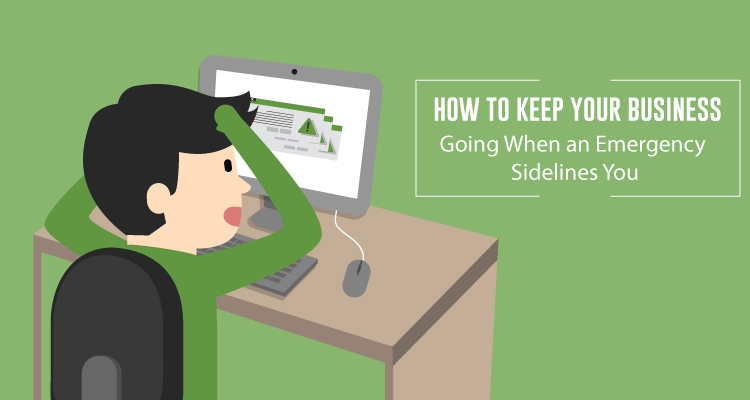What would you do if you’re a freelancer that gets sidelined by sickness or needs emergency surgery? What if there is a catastrophe like a fire that destroys all of your equipment or inventory?
Emergencies are bound to happen. The difference between those who bounce back and those who don’t is preparation. Here’s how to prepare for a potential emergency.

Table of Contents
ToggleKnow Your Achilles Heel
You are more than likely to have one or more emergency situations. Conduct an analysis of possible emergencies that you or your business could face. Some of the more common emergencies include:
- Medical emergencies. These happen frequently and suddenly. A medical emergency could be work injury, car accident, or surgery.
- Natural disasters. Floods, fires, earthquakes, hurricanes, and even thunderstorms can do serious harm to your business. This includes destroying property, inventory, or power outages.
- Prolonged power outages. These are more common than you realize and can affect running machinery, taking purchase orders, or sending out invoices.
- Security breaches. Even large enterprise companies like Target are vulnerable to security breaches like hacking and phishing scams that compromise financial and personal data.
- System crashes. Everything from employee records to your bookkeeping to website could be lost if not backed-up frequently.
- Lawsuits. Customers and employees could threaten a lawsuit against your business. Reasons might include copyright issues, discrimination or harassment cases, unfair payment policies, or data theft.
- Loss of an employee or business partner. Sometimes your employees or partners receive a better job offer or are forced to leave due to an emergency of their own. If they have a rapport with certain customers or knowledgeable in a specific area, this could have severe consequences on your business.
Business Response to an Emergency
Any of these emergencies can interrupt your cash flow. That’s why being aware of any possible emergency is the first step in handling. For example, if you reside in an area that’s prone to flooding, then want to make sure that you have adequate insurance.
At the same time, you don’t want to waste resources for emergencies that are less likely to occur. If you reside in Kansas, it wouldn’t make sense to be overly concerned about earthquakes or hurricanes.

Expect the Best But Plan for the Worst
Benjamin Franklin once said, “By failing to prepare, you are preparing to fail.” Since you’re already aware of the possible emergencies that may impact your business, you now have to prepare for these emergencies. Get started with these tips:
- Have an emergency fund. Setting aside for medical emergencies or when your business goes through lean months can keep your business operational and pay for these unforeseen expenses.
- Learn to delegate. Start assigning certain tasks to employees now. If you have to leave for an emergency, then you know there are trusted individuals who can run the business during your absence.
- Keep your schedule flexible. If you think you’re going to have to take a leave of absence, then reschedule meetings or ask for an extension.
- Have adequate insurance. Talk to an advisor, such as your attorney, about what kind of insurance will cover medical, worker’s comp, or property damage.
- Protect yourself from online threats. Have the latest anti-virus software and update all of your software. Consider using security tactics like encryption or biometrics.
- Be prepared in advance. This covers things like having emergency contact information and a first aid kit, back-up all of your data, fully charged batteries for your phone/tablet, and the make, model number, serial number and purchase price of your equipment and inventory. If you maintain a blog, have a couple of written articles on stand-by that either you or someone that you trust can publish if you’ll be gone for an extended period.
- Be honest with employees, clients, and customers. Alert those who need to know about the current situation. Even if it’s a short and to the point email or social media update is enough to give them peace of mind that you haven’t forgotten about them and you’ll be back as soon as possible.
More Emergency Planning Tips
Here are additional ways you can maintain business continuity in case of an emergency:
- Have a process in place. For example, you and your team should know which valves to shut-off during a natural disaster so that an explosion doesn’t occur in your home or office. It doesn’t have to be overly complicated. Just make sure that the basics are covered so that you prevent further damage.
- Create an emergency checklist. FedEx and the American Red Cross developed an Emergency Preparedness Checklist for Small Businesses that an help your business.
- Test emergency measures. Regularly make sure that everything you have planned is still relevant. It’s also good to just refresh everyone’s memory on what to do in case of an emergency.
- Ensure regulatory compliance. For example, those in the financial industry must comply with the Payment Card Industry Data Security Standards or PCI requirements. Know what compliance issues impact you so that you follow all guidelines.
















